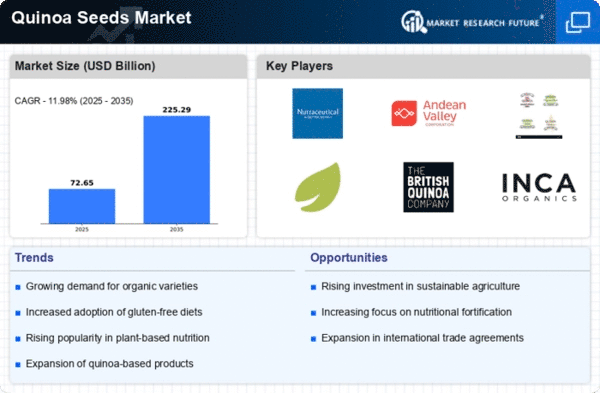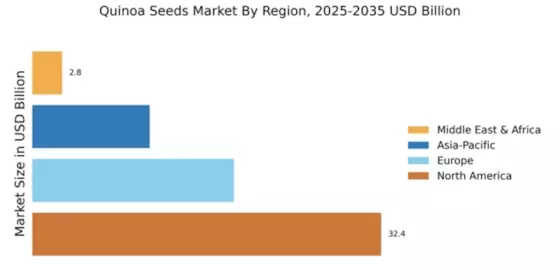Rising Health Consciousness
The increasing awareness of health and nutrition among consumers is driving the Global Quinoa Seeds Industry. Quinoa is recognized for its high protein content, essential amino acids, and gluten-free nature, making it a preferred choice for health-conscious individuals. As more people adopt plant-based diets, the demand for quinoa seeds is expected to rise significantly. In 2024, the market is projected to reach 64.9 USD Billion, reflecting a growing trend towards healthier food options. This shift in consumer preferences suggests that the Global Quinoa Seeds Industry will continue to expand as quinoa becomes a staple in health-oriented diets.
Diverse Culinary Applications
Quinoa's versatility in culinary applications is a significant driver for the Global Quinoa Seeds Industry. It is used in various dishes, from salads to baked goods, appealing to a wide range of consumers. The grain's ability to absorb flavors and its unique texture make it a popular ingredient in both traditional and modern cuisines. As culinary trends evolve, the demand for quinoa is likely to increase. This trend is supported by the projected CAGR of 11.98% for the period from 2025 to 2035, indicating that the Global Quinoa Seeds Industry will continue to thrive as chefs and home cooks alike embrace this nutritious grain.
Sustainable Agriculture Practices
The Global Quinoa Seeds Industry is benefiting from the increasing emphasis on sustainable agriculture. Farmers are increasingly adopting quinoa cultivation due to its resilience to adverse climatic conditions and low water requirements. This adaptability makes quinoa an attractive crop for regions facing water scarcity. The market is likely to see substantial growth as more farmers transition to sustainable practices. By 2035, the industry could reach 225.3 USD Billion, driven by the demand for environmentally friendly crops. This trend indicates a potential shift in agricultural practices, positioning quinoa as a key player in sustainable food production.
Market Trends and Growth Projections
The Global Quinoa Seeds Industry is poised for substantial growth, with projections indicating a market value of 64.9 USD Billion in 2024 and potentially reaching 225.3 USD Billion by 2035. This growth is driven by various factors, including rising health consciousness, sustainable agriculture practices, and the increasing popularity of plant-based diets. The anticipated CAGR of 11.98% from 2025 to 2035 suggests a robust expansion phase for the industry. These trends highlight the dynamic nature of the quinoa market, as it adapts to changing consumer preferences and global food security challenges.
Growing Vegan and Vegetarian Population
The rise in the vegan and vegetarian population is significantly influencing the Global Quinoa Seeds Industry. Quinoa serves as an excellent protein source for individuals following plant-based diets, providing essential nutrients that are often lacking in such diets. As more consumers seek alternatives to animal products, the demand for quinoa seeds is expected to surge. This demographic shift is likely to contribute to the market's growth, with projections suggesting that the industry could reach 225.3 USD Billion by 2035. The increasing popularity of plant-based diets indicates a promising future for quinoa as a staple food.
Nutritional Benefits and Functional Foods
The nutritional profile of quinoa, which includes high levels of fiber, vitamins, and minerals, positions it as a functional food in the Global Quinoa Seeds Industry. Consumers are increasingly seeking foods that offer health benefits beyond basic nutrition, and quinoa fits this demand perfectly. Its status as a superfood is driving its popularity among health enthusiasts and fitness communities. As awareness of functional foods grows, the market for quinoa seeds is likely to expand. The projected CAGR of 11.98% for 2025 to 2035 indicates a robust growth trajectory for the Global Quinoa Seeds Industry, reflecting the increasing consumer focus on health and wellness.

















